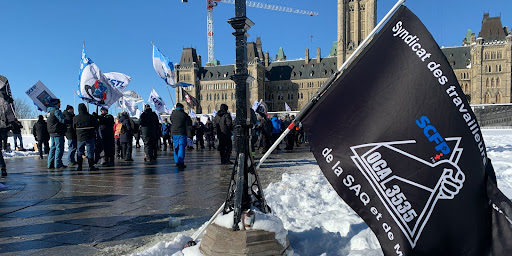Federal consultations for anti-scab legislation wrapped up last week and representatives from the NDP and the Canadian labour movement decided to mark the occasion. Led by the Canadian Union of Public Employees (CUPE), members from Unifor, the Public Service Alliance of Canada (PSAC), the United Steelworkers (USW) and other labour organizations brought flags, noisemakers and warm lunches to Parliament Hill on Tuesday, January 31 and rallied for the quick implementation of strong anti-scab legislation.
“As a union member and a union leader, I have long been frustrated by the lack of anti-scab legislation at the federal level,” said CUPE National President Mark Hancock at a press conference in the House of Commons foyer.
Scab labour is when employers hire replacement workers to complete the jobs of unionized employees who are on strike. Labour activists say the use of this type of labour can tip the scales in favour of the employer during negotiations. The ability to hire a replacement for a striking worker removes incentive for employers to negotiate a fair deal with workers who take job action.
Member of Parliament for the NDP, Alexandre Boulerice tabled Bill C-302 last fall, which, if turned into law, could stop federally regulated employers from using replacement workers during strikes.
READ MORE: With 60,000 Canadian workers on strike, NDP introduces anti-scab bill
“I’m frustrated that bosses routinely bring in scabs when negotiations aren’t going their way and try to pressure workers to accept the unacceptable,” Hancock said on Tuesday.
As labour leaders and members of the NDP spoke to the press, union members and allies outside echoed their calls.
“It is important that we are protected by our government,” said Brendan Taylor, who represents the 550 members of unit 602 in USW Local 1944.
Taylor works at telecommunications company Telus and said anti-scab legislation is important for him right now as they are currently in negotiations.
“At the moment, our employer is putting out to agencies to hire people onshore to do our work for us if we go on a lockout or work action,” Taylor said. “This takes away from the impact of the unionized members who give their blood, sweat and tears with this company.”
Some anti-scab bills already exist provincially
Anti-scab legislation is not unheard of in Canada. In Quebec and British Columbia anti-scab legislation already exists, and workers say it makes a difference.
“There are a lot of us from Quebec here today because we see that anti-scab laws are very important,” Frederic Boucher-Legault, the President of the Montreal Area Council of PSAC Quebec, said in french. “On the federal level, we don’t have any laws to protect us.”
“We saw that anti-scab laws do a lot to reduce levels of violence,” Boucher-Legault continued.
Anti-scab laws made a noticeable difference in British Columbia as well, according to CUPE’s Mark Hancock.
I’ve regularly negotiated collective agreements in my home province of British Columbia,” Hancock said. “I know that anti-scab legislation helps level the playing field.”
While the ball has started rolling on getting federal anti-scab legislation, last Tuesday’s demonstration showed that workers will not rest until it is implemented.
Mario Damour, president of Unifor Local 700, said that, from what he heard about Unifor’s involvement with consultations, there is a chance to move forward on this, but the labour movement must keep up the pressure.
“The government is going to leave it as it is if we’re not moving,” Damour said.
The end of federal consultations regarding anti-scab legislation shows progress on the government’s part, but demonstrators on the hill last Tuesday stressed how urgently this legislation is needed.
“The government needs to move forward rapidly,” Magali Picard, Quebec Federation of Labour President, said in french at Tuesday’s press conference. “No excuses will be tolerated if the Liberal Government doesn’t go forward with a bill… We are here, we are watching you and our expectations are very high.”



